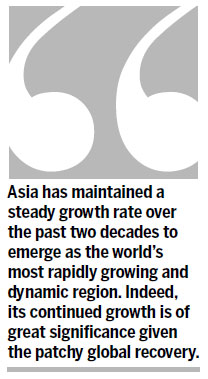Keep the Asian engine running
Updated: 2013-04-13 07:52
By Wu Jianmin (China Daily)
|
||||||||
China, Japan and other countries must make efforts to overcome their differences and strive for peace and common development
|
|
The Boao Forum for Asia, which concluded on Monday, drew a record number of participants, including dignitaries and former political leaders from five continents. The forum's annual conference, held in Boao city of Hainan province, is a platform for high-level leaders from governments, businesses and the academic world to discuss pressing issues in Asia and beyond. This year's conference, not surprisingly, drew greater attention thanks to Asia becoming the global economic powerhouse and to growing concerns over the region's stability.
Asia is now regarded as the engine of growth leading the world out of the global financial crisis. International Monetary Fund Managing Director Christine Lagarde, one of the world leaders who attended the forum, praised Asia as a "consistent global growth driver" accounting for two-thirds of global economic growth in the five years since the outbreak of the global financial crisis. And China contributed half of that growth.
Asia has maintained a steady growth rate over the past two decades to emerge as the world's most rapidly growing and dynamic region. Indeed, its continued growth is of great significance given the patchy global recovery. The United States used to be the main engine of global growth, but the global financial crisis pushed the country into economic turmoil and changed the world economic landscape. The center of the crisis later shifted to Europe with the worsening of the sovereign debt crisis in the eurozone.
After showing signs of real recovery, the troubled US economy unexpectedly shrank in the fourth quarter of 2012, the first time since 2009, exposing the halting nature of the country's recovery. As for Europe, recovery remains lopsided and uneven. It is still uncertain whether the European Union will, as earlier economic forecasts suggested, return to growth gradually in 2013. Under such circumstances, Asia's role as the driver of global growth remains crucial.
Asia has grabbed the world's attention for its economic successes, but it also faces growing security challenges. The Asia-Pacific region has remained basically peaceful and stable since the end of the Cold War, but conflicting claims over islands and maritime rights have generated tensions in the region in recent years. Territorial disputes in the South China Sea have strained ties between China and other claimant countries. And the Diaoyu Islands dispute has pushed Sino-Japanese relations to their lowest point since normalization of Beijing-Tokyo ties 41 years ago.
The regional issues, along with the "pivot to Asia" policy of the US, have complicated the regional security landscape further. The US has always maintained a strong presence in Asia, but now it is boosting its scale as the center of international relations shifts from the Atlantic to the Pacific.
China's rise obviously plays a key role in this respect. In 2001, China's GDP was $1.15 trillion, the sixth highest in the world. But by 2011, it had become the world's second-largest economy with its GDP reaching $7.3 trillion, equal to 49 percent of the US'. Understandably, China's unprecedented rise has caused concerns among the US, as well as some of its Asian neighbors. Given the major economic fallout of the Sino-Japanese dispute and some other countries' not-so friendly attitude toward China, many people now wonder whether Asia will be able to maintain peace and stability and preserve its status as the center of global growth.
The restoration of friendly ties between Beijing and Tokyo will, no doubt, have a far-reaching impact on regional peace and stability. In fact, Beijing is ready to resolve the Diaoyu dispute through dialogue and consultation. The problem is that Japan is turning decisively to the right, with its right-wing activists fueling nationalistic passions against China and thus weakening the efforts to maintain peace and violating the principles enshrined in the four political documents signed by the two countries.
Long-term peaceful and friendly cooperation, however, remains the only choice for the two countries, as well as for the Asian community. Delivering a keynote speech at the Boao Forum for Asia Annual Conference 2013, President Xi Jinping said: "Peace, like air and sunshine, is hardly noticed when people are benefiting from it, but none of us can live without them." Without peace, development is out of the question, he added.
Xi's words reflect China's diplomatic direction and represent the wishes of the people of China, Japan and other Asian countries. Peace and development is the trend of the times, and Asian countries have to make concerted efforts to overcome their differences and strive for peace, stability and common development of Asia and beyond.
The author is vice-chairman of the Institute of Strategy and Management, Beijing, and a member of the Foreign Policy Advisory Committee of the Ministry of Foreign Affairs.

 Li Na on Time cover, makes influential 100 list
Li Na on Time cover, makes influential 100 list
 FBI releases photos of 2 Boston bombings suspects
FBI releases photos of 2 Boston bombings suspects
 World's wackiest hairstyles
World's wackiest hairstyles
 Sandstorms strike Northwest China
Sandstorms strike Northwest China
 Never-seen photos of Madonna on display
Never-seen photos of Madonna on display
 H7N9 outbreak linked to waterfowl migration
H7N9 outbreak linked to waterfowl migration
 Dozens feared dead in Texas plant blast
Dozens feared dead in Texas plant blast
 Venezuelan court rules out manual votes counting
Venezuelan court rules out manual votes counting
Most Viewed
Editor's Picks

|

|

|

|

|

|
Today's Top News
Boston bombing suspect reported cornered on boat
7.0-magnitude quake hits Sichuan
Cross-talk artist helps to spread the word
'Green' awareness levels drop in Beijing
Palace Museum spruces up
First couple on Time's list of most influential
H7N9 flu transmission studied
Trading channels 'need to broaden'
US Weekly

|

|








